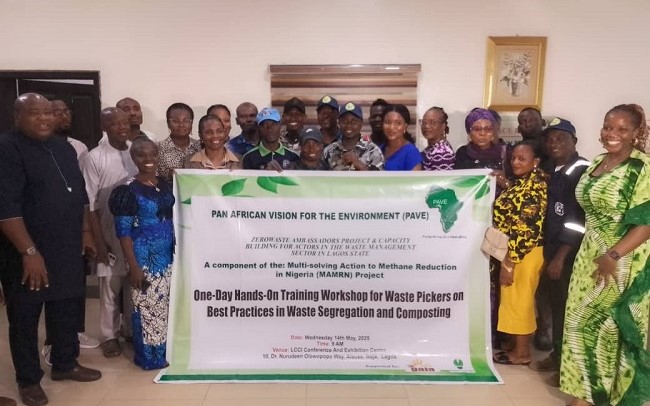The Pan African Vision for the Environment (PAVE) has hosted a two-day capacity building workshop designed specifically for waste pickers in Lagos State.

The workshop, which held from Wednesday, May 14 to Thursday, May 15, 2025, is described as a key activity of the Zero Waste Ambassadors Project and Capacity Building for Actors in the Waste Management Sector in Lagos State, which forms an integral part of the Multi-solving Action to Methane Reduction in Nigeria (MAMRN) Project.
Mr. Anthony Akpan, President of PAVE, opined that the workshop seeks to raise awareness and build the capacity of waste pickers to better understand organic waste and how it can be transformed into valuable resources such as compost and bio-inputs.
He said: “By improving organic waste management, participants are empowered to take concrete actions that support climate change mitigation, enhance their income opportunities, and promote a cleaner and healthier Lagos.”
Akpan added that PAVE is working in collaboration with the Association of Scraps and Waste-Pickers of Lagos State (ASWOL) to establish a case for proper recognition of the role that waste pickers play in urban management and the need to safeguard their livelihoods.
“We seek to address questions that are critical to understanding the role of waste pickers in the waste management ecosystem of Lagos, the institutional frameworks guiding their activities, their lived experiences and livelihood challenges, as well as the innovative practices that emerge in response to these challenges. Waste pickers are a visible, yet unrecognised workforce in Lagos, Nigeria’s largest city.
“They perform tasks associated with the well-being of city dwellers while contributing to aesthetics, cleanliness and optimal functioning of the city itself. They are indispensable actors in municipal waste management. However, in-spite of their obvious importance, they are often unrecognised informal workers lacking the social and economic opportunities required for a decent life. Minimal recognition has been accorded to them or their work in both research and policy circles in Lagos.”
The Project Facilitator, Aghaji Ujunwa Victoria, in her presentation, outlined how best to waste manage which encompass a range for handling unwanted materials, prioritising prevention, minimisation, reuse, recycling, and disposal.
In her presentation titled “Training for Waste-Pickers on Organic Waste Management to Reduce Methane Emission”, the facilitator identified waste sorting, waste selection and waste segregation as the best waste management techniques as, according to her, this goes a long way to reduce the environmental impact of waste, conserve resources, and recover value from discarded materials.
In his submission, Philip Jakpor, Executive Director of Renevlyn Development Initiative (RDI), advised the waste pickers to always engage in trainings and workshops in order to have a better perspective on how to do things in the sector.
He charged the waste pickers not to shy away from networking with people from all works of life.
“Networking will also enable the waste-pickers to build confidence which will enable them to learn and share with like-minded groups and access to knowledge and expertise which will enhance creative mindset,” Jakpor said.
Speaking on the workshop, Dr. Leslie Adogame, Executive Director, Sustainable Research and Action for Environmental Development (SRADev Nigeria) applauded PAVE for embarking on such a laudable project.
Adogame, who classified waste pickers as the most important stakeholder in the entire waste management value chain, also appealed to the government to encourage more stakeholders and investors to come into the waste management, saying: “This will go a long way in benefiting the society at large.”
In his submission, Friday Oku, President, Association of Scraps and Waste Pickers of Lagos (ASWOL), highlighted the challenges faced by waste-pickers on a daily basis. He said his members are faced with health, social and financial risks.
While urging the government to consider provision of incentives to stakeholders in the waste management sector, Mr. Oku also advised that waste pickers should be involved in policies that have to do with waste management in the country.
Part of the activities on the first day of the session was a paper presentation on “Organic Waste Management Through Black Soldier Fly (BSF)” by Abiola Adegoke Saheed.
This presentation offered an effective solution for managing organic waste by converting it into valuable resources.
Saheed stated that the larvae of Black Soldier Fly are known for their rapid digestion of food scraps, manure, and other organic materials, producing protein-rich biomass and nutrient-rich frass (excrement) that can be used as fertiliser. He, however, urged members of ASWOL to tap into this opportunity.
The workshop was graced by dignitaries such as Adenaike Olabimpe, Controller, Federal Ministry of Environment, Lagos, represented by Mrs. Bernardine Ejiogu; members of ASWOL; and many other stakeholders in the waste management sector.
The MAMRN Project aims to reduce and mitigate methane emissions from the waste sector by promoting sustainable, inclusive, and low-emission practices.
By Ajibola Adedoye
